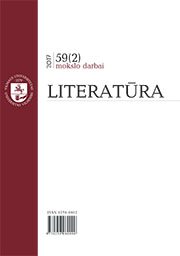Ахматова в поле русской литературы 1940–1960-х гг.: прагматика и семантика стихотворных посвящений М. А. и Е. C. Булгаковым
Anna Akhmatova in the Russian Literary Field (1940s–1960s): Pragmatics and Semantics of the Poetic Dedications to M. A. Bulgakov and E. S. Bulgakova
Author(s): Galina MikhailovaSubject(s): Semantics, Pragmatics, Russian Literature, Theory of Literature
Published by: Vilniaus Universiteto Leidykla
Keywords: literary field; dedication; hierarchy; myth; memoirs; “thaw”;
Summary/Abstract: This article is based on Pierre Bourdieu’s theory of fields, more precisely – on the concept of the literary field. The poetic dedication to Mikhail Bulgakov is considered as one of examples of Anna Akhmatova’s “positions and trajectories” in the Russian literary field. An epitaph to Mikhail Bulgakov, which was included in the poetic cycle A Wreath for the Dead, and the poem Hostess, devoted to Elena Bulgakova, are regarded as certain artifacts the reason and purpose of which were not only in the addressees of dedications. The history of creation and announcement of the epitaphs (in the censored and not censored circumstances) as well as the semantics of these poems show the aspiration of the poet to contribute to the sphere of “cultural production,” which was corrected in the “thaw” years. Akhmatova, as an “agent” of the cultural field, had the considerable “symbolic capital” and sought to take part in the course of a statement of other (not Soviet) regulating norms and the others, the earlier rejected (discriminated) as well as the aesthetic and ethical values in the modern Russian literary field. Certain “movements” of Akhmatova in this direction coincided with the “gestures” of Elena Bulgakova and the other “agents” of the literary field, who moved Mikhail Bulgakov’s personality and works from the periphery of cultural process to its center.
Journal: Literatūra
- Issue Year: 59/2017
- Issue No: 2
- Page Range: 109-121
- Page Count: 13
- Language: Russian

